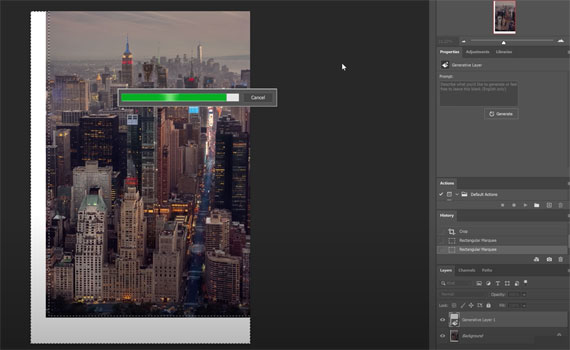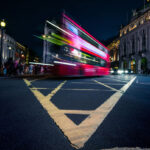Photoshop, the ubiquitous tool of photographers and graphic designers, has unveiled a groundbreaking feature called ‘Generative Fill’. If you’ve ever thought about an AI tool that could seamlessly insert objects into your images, expand your borders, or replace your background, then Generative Fill is the ultimate game-changer. Patrick Hall from Fstoppers took it for a spin, offering an insightful walkthrough of its capabilities:

Hall stumbled upon this new feature, which had him tossing and turning all night. This innovative addition to Photoshop could either be a photographer’s ultimate dream or the downfall of traditional photography as we know it.
To utilize this feature, users need to download the latest version of Photoshop, currently 24.5, as well as the new Photoshop Beta from the Creative Cloud. Afterward, the Generative Fill feature will be accessible.
The results of Hall’s trial were astonishing, starting with a self-portrait headshot. Using the marquee tool, he selected all the white spaces and used Generative Fill to replace the pixels he’d deleted. The results were stunning, perfectly maintaining the shallow depth of field. He compared the before and after images, and it was near impossible to distinguish between them.
Hall proceeded to apply the Generative Fill feature to a dried-up riverbed photograph he had taken in Curacao. By feathering the selection and running the generative fill, the result was just as convincing as the original image.
In a remarkable display of the AI’s capabilities, Hall selected a model in one of his photographs and instructed the AI to add a gray turtleneck sweater. The results were stunningly realistic, even altering the arm position to match the clothing’s fitting.
Taking a step further into the realm of complexity, Hall tackled an architectural photograph of New York City, attempting to extend Central Park at the bottom of the image and expand the left side. The results were varied, with some sections requiring additional adjustments. Nevertheless, it produced reasonably convincing results, providing an intriguing tool for graphic designers.
In another test, Hall used Generative Fill to restore an old photograph of his wife. He managed to eliminate glare from a shirt while preserving the clothing’s natural look. The AI provided multiple variations, and the final result was shockingly accurate.
When testing the feature on a landscape shot of his neighborhood, Hall was able to remove an unwanted rooftop from the image and even insert a small yacht into the scene. Again, the AI delivered impressively realistic results.
Finally, Hall used Generative Fill on a piece of fine art photography – a series by Mike Kelly featuring planes in flight, arranged in a wallpaper motif. The AI attempted to replicate Kelly’s work by creating a similar pattern. While some planes appeared distorted, the AI’s attempt at creating hybrid artwork was fascinating.
As Hall’s walkthrough demonstrates, Generative Fill is potentially revolutionary for the world of digital art and photography. It’s an incredible leap forward in AI image manipulation, offering limitless possibilities for artists, photographers, and graphic designers.
However, as exciting as these advancements are, they also open up a new realm of ethical questions. As AI tools become more adept at creating convincing manipulations, it’s crucial to remember the importance of authenticity in the world of photography and art. But, as Patrick Hall demonstrated, it’s hard not to be enthralled by the magic of Generative Fill.
Like This Article?
Don't Miss The Next One!
Join over 100,000 photographers of all experience levels who receive our free photography tips and articles to stay current:







Leave a Reply